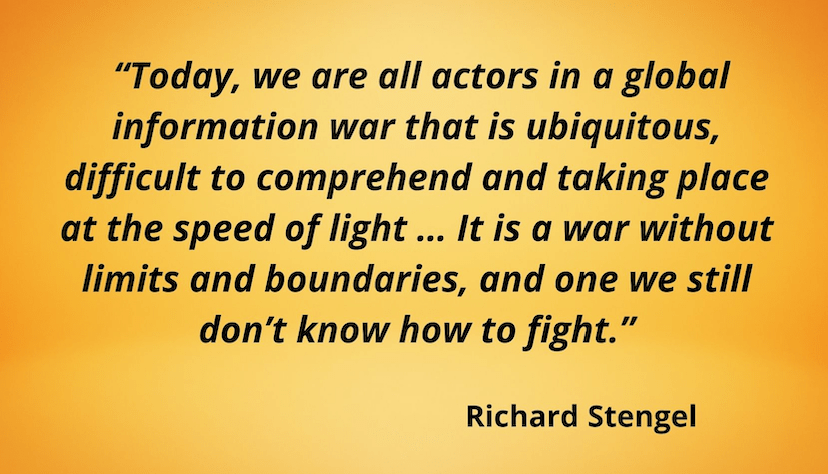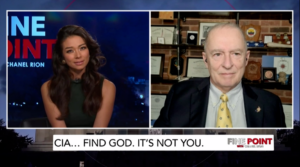RELUCTANT MISSIVES: THE FUTURE OF WAR
(PART ONE)
by Jeemes Akers
The Early Skirmishes of an Undeclared War
“Today, we are all actors in a global information war that is ubiquitous, difficult to comprehend and taking place at the speed of light … It is a war without limits and boundaries, and one we still don’t know how to fight.”
Richard Stengel[1]
“Imagine the amount of valuable intelligence that passes over the WiFi networks of Washington D.C., coffee shops—or even the networks at government buildings. It only takes one weak link in a security chain for a hacker to get access to those networks and the information passing through them.”
Newt Gingrich[2]
“Sen. Dan Sullivan (R-Alaska): What do you think our adversaries think right now? If you do a cyberattack on America, what’s going to happen to them?
Lt. Gen. Paul Nakasone (Commander of US Army Cyber Command): So basically, I would say right now they do not think that much will happen to them.
Sullivan: They don’t fear us?
Nakasone: They don’t fear us.
Sullivan: So is that good?
Nakasone: It is not good, Senator.”
Lt. Gen. Paul Nakasone’s confirmation hearing, March 1, 2018
War has been declared on the U.S., but many of us in this country remain largely oblivious to the true nature of the threat.
There are a number of reasons for this—and many of you would disagree with my list—so I’ll only mention one: our national obsession for getting wrapped around the axle of political differences which have distracted (if not blinded) us to ominous developments abroad.
Meanwhile, the world is changing and with it the nature of warfare.
Gone are the days when war was defined (and waged) in largely kinetic terms: “metal on helmets” in conventional, nuclear, or guerrilla environments. The United States was uniquely equipped to prevail in that type of warfare. Following World War II, the United States triumphed over its main rival—the Soviet Union—and basically controlled global politics, economy, institutions and technological developments.
Our leaders forged a new American Empire that lasted a hundred years: but that was yesterday’s world. My grandchildren and most of my students—a group I often refer to as my “twin seeds”—no longer live in that world.
Today, war (or near-war) is primarily conducted in the “gray zone.” For instance, consider the recently uncovered SolarWinds cybersecurity attack, a hacking attack so insidious and prolonged, that it has become shorthand for a “hacking catastrophe.”[3] What happened? In December 2020, the cybersecurity firm Fireye discovered it had been hacked and, upon digging deeper, found they were only part of a far larger hacking attack that was caused by spyware implanted via the IT management and security platform Orion (a top-selling product of an Austin-based software firm called SolarWinds). Subsequently, it was discovered that the compromised software not only included corporate customers, but it also had exposed systems at the U.S. Treasury, the State Department and the Department of Homeland Security. The attack—unnoticed for more than a year—was so methodical and effective in its intelligence-gathering approach that only a nation-state could be behind it: by early January 2021, U.S. intelligence agencies were pointing their finger at Russia.
In recent years, the primary adversaries to the United States and the West have changed the playbook. They no longer play by the rules that provided such an advantage to the Unites States military and Western powers. For a century we have dictated the rules of war on our terms. The kinetic war environment has been replaced by a world of constant digital conflict.
The rules of war have been flipped completely.
David E. Sanger, in his excellent book The Perfect Weapon: War, Sabotage, and Fear in the Cyber Age puts it this way: “The lesson of the past decade is that, unless shooting breaks out, it will always be unclear if we are at peace or at war … We are living in a gray zone, one of constant digital conflict …”[4] Jim Sciutto,[5] further amplifies this idea in his book, The Shadow War; Inside Russia’s and China’s Secret Operations to Defeat America:
“This [conflict that America is uncomfortable doing] is hybrid warfare, in short, a strategy of attacking an adversary while remaining just below the threshold of conventional war—what military commanders and strategists refer to as the ‘gray zone’—using a range of hard- and soft- power tactics: from cyberattacks on critical infrastructure, to deploying threats to space assets, to information operations designed to spark domestic division, to territorial acquisition just short of a formal invasion. This is warfare conducted in the shadows—A Shadow War—though with consequences as concrete and lasting as those of all-out war.”[6]
Few of my twin seeds alive today realize that we are currently embroiled in a hidden war. Most of the media refuses to acknowledge it, economists ignore it, preachers won’t address it, and vote-seeking left-leaning politicians want to divert any attention to it by hiding behind a phalanx of other faux critical issues ranging from climate change and impeachment strategies to immigration. Unless addressed, it will lead to open, global war during my twin seeds’ lives.
One senior government official provides a further glimpse of this secret war:
“When I was at the State Department, there were hundreds of thousands of cyberattacks a day. The Pentagon says it thwarts more than a million malware attacks an hour. About 600,000 Facebook accounts are compromised every day. More than 25 million data records are lost or stolen from businesses each day. And all that doesn’t even take into account the rising tide of disinformation.”[7]
At the end of each CofO semester, in my history classes, I try to convince my students that they live in an era where there is a totally new kind of unseen war. Indeed, some scholars suggest we are already involved in World War III but it is so different in nature that we don’t even recognize it. My personal interest in this topic was prompted by an article by Peter Pomerantsev,[8] who asserted, among other things, the following:
Beginning in about 2015, from Russia in Europe, to China in Asia and the Middle East, there has been a “flourishing of conflicts that exist in the gray zone, one which is not quite open war but more than regular competition, which is attuned to globalization, which liberal democracies are ill-equipped to deal with, and which may well be the way power is exercised and conflict conducted in the foreseeable future.”
Scholars have variously described this tension as “hybrid,” “full-spectrum,” “non-linear,” “next-generation,” or “ambiguous” warfare, as it mixes “psychological, media, economic, cyber, and military operations without requiring a declaration of war.” The new form of conflict features “hyper-intense propaganda” that cultivates unrest inside the country by sowing enmity among segments of society and relies on confusing opponents with waves of disinformation. In some extreme cases, proxy forces and covert troops launch just enough military offensives to ensure to ensure the government looks weak. The point is not to occupy territory—but to destabilize. The classic example is Russia and the Ukraine (and some would argue Putin’s attempts to use social media outlets to sow disinformation during the U.S. presidential campaign in 2016).
The weaponry for this new approach emphasizes information. There is, of course nothing new about using information as a vital instrument of war. “But in the past information tended to be a handmaiden to action. Now the informational element appears to be as important as, if not more important than, the physical dimension.” For example, in Syria, the Russian military may be small compared to America’s, and the Russian economy may be a mess, but Vladimir Putin has cleverly undermined America’s reputation as a ‘global policeman’ and boosted his stature as the man who is restoring Russia as a Great Global Power.”
The new game uses “strategic narrative” to keep your opponent intimidated, confused, and dismayed. Opponents in this new form of conflict exploit ubiquitous information to appear bigger, scarier, and more indispensable than reality would suggest. So, what matters in the information age is not so much “military escalation dominance”—the Cold War doctrine emphasizing the ability to introduce more arms than the enemy into a conflict. Rather, it’s “narrative escalation dominance”—being able to introduce more startling storylines than your opponent.
Today’s globalization means that the major nation states are unlikely to declare full-on war but leads to a situation of “political promiscuity”—wherein geopolitical alliances are short-term and tactical. Such relationships have all the depth of Facebook friendships, likes, and bans.
Liberal democracies in the West find it very difficult to act in this new “gray zone.” Why? It is relatively easy for authoritarian regimes such as Russia and China to fuse the efforts of military, media, and business entities, to fight this form of war. In democracies, however, the interests of these groups are often diametrically opposed. Western societies can mobilize when official states of war are declared, but “they are more at a loss when responding to not-quite-wars that are undeclared.”
New strategies to counter this new “gray zone” war are needed. Russian doctrine, for example, argues that corrupting another country’s elites is part of a “new generation” war. Such ideas highlight two important elements of hybrid conflicts: first, the power of civil society and social media in this new form of struggle (including the role played by the hacking collectives and individual bloggers); and second, the value of an asymmetric approach to gray-zone conflicts.[9]
(We will discuss China’s specific gray-zone warfare strategies in Part Three).
[1] Richard Stengel is a former U.S. State Department employee. Read his interesting and informative account, “The global war on truth: How Russia’s information war started and how to stop it,” Time, September 2019. The article was based on Stengel’s forthcoming book, Information Wars: How We Lost the Global Battle Against Disinformation & What We Can Do About It.
[2] Newt Gingrich is the former Speaker of the House of Representatives and spokesman for a number of conservative political causes. Quote is from his opinion piece “A secret war is being fought all around us—And you may become a target,” Fox News, September 22, 2019.
[3] David Z. Morris and Robert Hackett, “After SolarWinds: Untangling America’s cybersecurity mess,” Fortune, Jan. 29, 2021.
[4] David E, Sanger, The Perfect Weapon, Crown: New York, 2018, p. 308.
[5] James Ernest Sciutto (born 1970) is a well-known journalist, news anchor and Chief National security Correspondent for CNN, specializing in various aspects of national security. He was part of President Obama’s national security team, serving as Chief of Staff to U.S. Ambassador Gary Locke at the U.S. Embassy in Beijing from 2011 to 2013. He majored in Chinese history at Yale University, graduating in 1992. His controversial report in early October 2019 that an intelligence operative was forced to be pulled out of Russia due to Trump administration missteps was roundly criticized by other media outlets, administrative sources and the intelligence community itself.
[6] Jim Sciutto, The Shadow War, HarperCollins: New York, 2019, from Chapter One, “Inside the Shadow War.”
[7] Ibid.
[8] Peter Pomerantsev, “Brave New War: A New Form of Conflict Emerged in 2015—from the Islamic State to the South China Sea,” The Atlantic, posted on-line on 29 December 2015.
[9] Each of these characteristics were gisted from the Pomerantsev article.




